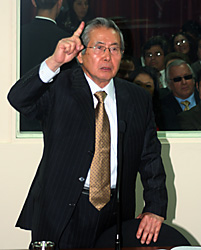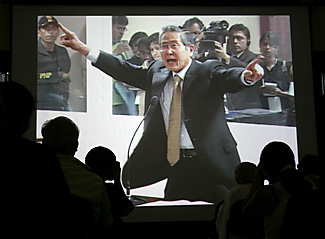

(above-left) Alberto Fujimori screamed at judges Monday during Day 1 of his
trials in Lima, Peru.
Photo: Francisco Medina/Reuters
(above-right) In Lima, former President Alberto Fujimori
is seen gesturing on a screen during the first day of his trial on charges
of alleged human rights violations and corruption during his rule.
Photo: Martin Mejia/AP
Fujimori outburst sets tone for Peru human rights trials
Peru's former leader let loose a tirade as his human rights and corruption
trials began Monday.
December 12, 2007 - Christian Science Monitor
By Lucien Chauvin, Correspondent of The Christian Science Monitor
Lima, Peru -- The multiple human rights and corruption trials of Peru's
Alberto Fujimori got off to a colorful start this week when the former
president launched into a tirade denying the charges against him and
taking credit for the country's current economic boom.
Mr. Fujimori, who ruled Peru from 1990-2000, began facing a three-judge panel Monday on charges that he approved the death-squad murders of 15 people in 1991 and nine students and a professor the following year. The trial also includes the charge of authorizing the kidnapping and torture of a journalist and a businessman, also in 1992.
He also may face a seven-year sentence in a separate trial on abuse of authority charges.
Fujimori disrupted the mundane administrative chores of the initial hearings Monday when he asked permission to briefly address the court before entering a plea.
The former president immediately threw up his arms, contorted his face, and started screaming that he had saved Peru from imminent collapse when he first took office in July 1990.
"I received Peru in 1990 in a state of collapse, with hyperinflation, international isolation, and widespread terrorism... Peru is progressing today because there were reforms in the context of respect for human rights," he yelled. "I totally reject the charges. I am innocent."
After shouting down the chief judge for a few moments, Fujimori stopped, politely thanked the court for the chance to speak and, smoothing his dark gray, pinstripe suit, calmly returned to his seat in the center of the small courtroom built for the trial on a police base where he has been incarcerated since September.
The outburst fits the image that both Fujimori's supporters and detractors hold of him, and it is likely to set the tone for the trials, which are expected to last at least six months.
"If he acts this way, in the context of a trial and while under arrest, imagine how he must have been when he had all the power in his hands as president," says Gloria Cano, a lawyer representing victims of those killed in the 1991 massacre.
Fujimori is proud of his legacy
Fujimori, a math professor, stunned Peruvians in 1990 by coming out of nowhere to win the presidency. He took office with inflation galloping in four digits, the economy shrinking by double digits, and nearly 75 percent of Peru's territory under a state of emergency because of the actions of two leftist rebels groups, the Shining Path and Tupac Amaru Revolutionary Movement.
Fujimori's economic reforms stopped inflation and reinserted Peru into the world financial community while new antiterrorism laws facilitated the arrests of the heads of the two subversive groups, effectively stopping them as threats to the Peruvian state. Fujimori and his followers hope that this is what Peruvians remember, and it is what he focused on in Monday's outburst.
Opponents do not deny these successes, but say they came with a high cost to the country's democracy.
When Congress balked at economic and legal changes, Fujimori simply closed it and the judiciary in April 1992, originally trying to govern alone with the Army and intelligence service. When that was not possible, he had a new Constitution written. The main change, foreshadowing a current trend in the region, allowed for immediate presidential reelection.
Fujimori ran and won again in 1995, and reinterpreted his own Constitution to allow for a third bid in 2000. He also won that contest, although later evidence would show that massive voter fraud committed throughout the electoral cycle helped him.
His third term only lasted four months. He fled Peru in November 2000, escaping a massive corruption scandal that would land his closest collaborators, including former Army chief Gen. Nicolas Hermoza and security adviser Vladimiro Montesinos, in prison.
Fujimori spent five years in Japan, his parents' homeland, but flew secretly to Chile in 2005, with the alleged intention of returning home in time for elections the following year. He never made it. Chilean authorities arrested him and the country's Supreme Court approved this past September seven of the 12 extradition requests filed against him.
Fujimori's supporters are confident that he will be exonerated and make a comeback for the 2011 elections.
Supporters confident
"Today was an opportunity to the president to set the record straight. He is the man responsible for Peru's good fortune. Peruvians are going to see through this charade. They are the real judges here and the verdict will be in our favor," says Rep. Carlos Raffo.
Recent trials of former collaborators, however, are not promising. Ten of Fujimori's former cabinet members were found guilty in late November of violating the Constitution because of their support for the 1992 move that closed Congress. Nine received suspended sentences, while one was given a 10-year sentence.
Even more damaging, his former security adviser and right-hand man, Mr. Montesinos, testified last week that he did not make any decisions on his own, always taking orders from Fujimori. That trial was about election fraud in 2000, but Montesinos, already found guilty in more than 20 cases from the Fujimori era, will also be one of the principal witnesses in the trial of his former boss.